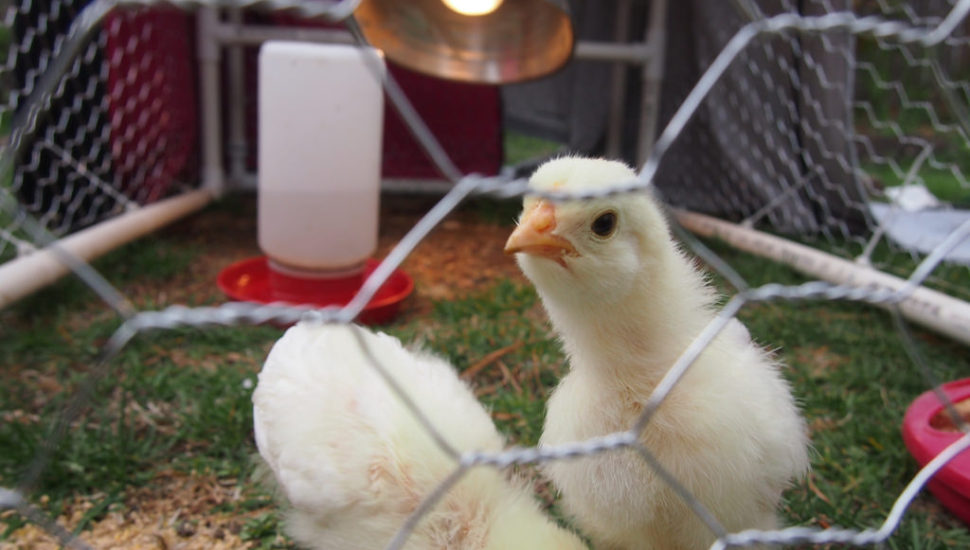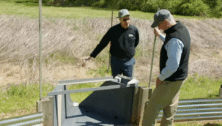Ag Notes: Chester County Prepared For Avian Flu Outbreak

By Duncan Allison
The avian flu outbreak in the Midwest has been described as “the largest animal health emergency in this country’s history.” The infection has been traced to commercial poultry flocks which must have been infected by wild birds migrating from Canada last winter.
The cause was found to be the Highly Pathogenic Avian Influenza (HPAI) virus which is extremely contagious and often fatal in domestic birds. The virus spreads through infected birds, via their saliva, nasal secretions, feces, and feed.
There is no vaccine and as soon as there is any sign of infection in a poultry house, the birds have to be euthanized to avoid any possibility of spreading the disease.
42.5 million chickens and 7.5 million turkeys have had to be destroyed and extremely strict biosecurity measures have been instituted to prevent any further outbreak. Overall losses to farmers and suppliers are estimated at $3.3 billion. Egg prices have been “elevated” and this is likely to linger for at least 12 months and could last for 2-3 years.
No highly pathogenic avian influenza viruses have been detected in Pennsylvania since 1983/1984 when 17 million birds were lost to avian flu causing $65 million loss to the economy. According to Pennsylvania Agriculture Secretary Redding “We have been fortunate enough to dodge this virus so far but when birds begin migrating we can’t say that we will be so lucky.”
The poultry industry in Pennsylvania is broad based with a mix of egg layers, broilers, turkeys and ducks worth an estimated $1.5 billion a year. Chester County is not significantly involved in commercial poultry production but there are several commercial duck, poultry and turkey units and increasing interest in backyard hens. The first case of avian influenza in 1983 was diagnosed at New Bolton Center
During the last few months very comprehensive plans have been made to detect any sign of infection arising in Pennsylvania. All the departments of state government including Penn State Extension, Penn Vet , Penn State and the poultry industry have worked together to ensure a rapid and thorough response to any report of infected hens.
The infected area will be totally isolated and tight security measures implemented. $3.5 million of state funding have been earmarked to cover the costs of such an eventuality. Officials are on the alert for any signs of suspicious symptoms. Our poultry enterprises in Chester County are already following strict biosecurity regulations.
Avian flu does not normally infect humans so there are not considered to be any serious health concerns to us. There is no evidence that the virus can survive in well cooked meat.However egg prices nationally have been trending up because of the loss of laying birds in the Midwest as Iowa is the largest US egg producer.
The combination of strict biosecurity measures in Iowa and other infected states and the flu virus not favoring hot weather, less activity has been found during the summer months. However officials are concerned that migratory birds on their way south could introduce HPAI infected to birds in Pennsylvania and southern states where the bulk of our broiler chickens are raised.
_________
 Duncan Allison gained degrees in horticulture and extension education in the UK and US and spent most of his career working for the DuPont Company developing and marketing crop protection chemicals. Recently he has written reports for a global ag publisher and for New Jersey-based international business consultants Kline & Co. For the last 16 years he has been heavily involved in the local farming of Chester County where he has lived with his wife and family since 1980.
Duncan Allison gained degrees in horticulture and extension education in the UK and US and spent most of his career working for the DuPont Company developing and marketing crop protection chemicals. Recently he has written reports for a global ag publisher and for New Jersey-based international business consultants Kline & Co. For the last 16 years he has been heavily involved in the local farming of Chester County where he has lived with his wife and family since 1980.
Top photo credit: chicks in the yard! via photopin (license)
Connect With Your Community
Subscribe to stay informed!
"*" indicates required fields












![95000-1023_ACJ_BannerAd[1]](https://vista.today/wp-content/uploads/2023/03/95000-1023_ACJ_BannerAd1.jpg)




































